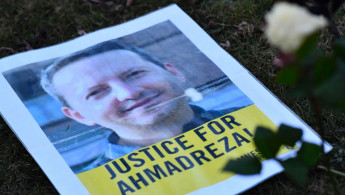Iranian scientist facing death penalty granted citizenship in Sweden
Ahmadreza Djalali, a medical doctor and lecturer at the Karolinska Institute in Stockholm, was arrested in Iran in April 2016 and later convicted of espionage, having been accused of providing information to Israel to help it assassinate several senior nuclear scientists.
His death sentence was upheld by Iran's Supreme Court and Tehran prosecutor Abbas Jafari Dolatabadi said Djalali had confessed to meeting agents of Israeli intelligence agency Mossad to deliver information on Iran's nuclear and defence plans and personnel.
"We know that he has been granted citizenship by the Migration Board. We continue in our consular work for Djalali and request consular access to our citizen," a Swedish foreign ministry spokeswoman said.
"We have been in regular contact with Iranian representatives, requested access to Djalali and presented Sweden's view of the death penalty, which we condemn in all its forms. Our demand is that the death penalty is not carried out," the spokeswoman said.
Djalali had been on a business trip to Iran when he was arrested and sent to the notorious Evin prison. He was held in solitary confinement for three months and tortured, rights group Amnesty International has said.
Amnesty said Djalali wrote a letter from inside prison in August stating he was being held for refusing to spy for Iran.
Last year, 75 Nobel prize laureates petitioned Iranian authorities to free Djalali so he could "continue his scholarly work for the benefit of mankind".
International rights group have repeatedly criticised Iran for its high number of capital punishments for offences involving drug trafficking, murder, rape, armed robbery and adultery.





 Follow the Middle East's top stories in English at The New Arab on Google News
Follow the Middle East's top stories in English at The New Arab on Google News
![Israeli forces ordered bombed Gaza's Jabalia, ordering residents to leave [Getty]](/sites/default/files/styles/image_330x185/public/2176418030.jpeg?h=a5f2f23a&itok=_YGZaP1z)

